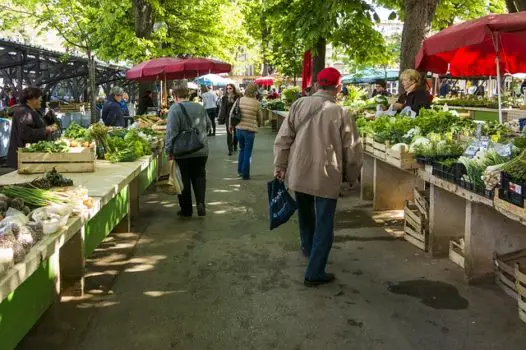When operating a homestead, farm, small farm, backyard garden, or greenhouse, you have likely had the idea of trying to generate income by selling some of your produce. Whether it be just to earn a few dollars on the side, or to set up a highly profitable cash income, we are strong proponents of doing this through participation in local or regional farmers markets.
The idea of selling your product can be a bit intimidating and confusing at first, but don’t give up. The benefits of being involved on the farmers market scene are highly worth it, both economically, and socially. This article will walk you through the initial steps to get into the farmers market business and begin making money from your farm grown produce and commodities.
Reasons for Farmers Markets
Farmers markets have been around since there have been farmers to market products. Though the market concept has morphed over the years from street and store front vendors to traveling delivery services, the basic idea has remained in tact — the farmer or his agent still brings his produce or wares to a general location where it is distributed or sold to a consumer.
Similarly, the support of local farmers markets has ebbed and flowed throughout time but has had a steady increase in popularity in recent years. Many people are finding that fresh, locally produced fruits, vegetables, eggs, and honey are higher in quality, taste, and nutrient level. Buying locally produced fruits and veggies also allows the consumer to meet and build relationships with those who are providing food for them.
With locally grown and produced fruits, vegetables, eggs, meat, or honey, the buyer knows what they are getting is fresh. They know the degree to which it has been processed, and know who grew and produced it. Perhaps the greatest advantage to buying locally harvested produce is that the flavor is better because it was picked or harvested at the best time.
The farmers market provides a convenient and efficient opportunity for both farmer and consumer to exchange commodities. Most farmers markets are scheduled biweekly at a set time and location which allows people to purchase efficiently, without wasting the harvester’s valuable time. The schedule and consistency of a farmers marker aids in the sales for farmers, and the availability of produce for consumers.
Types of farmers markets
There are many types of farmers markets showing up. Most have a component of farmers renting a booth space and selling their produce directly to the consumer. This model has been a tried and true method that works well to the present day.
Small Neighborhood or Community Farmers Market
Some farmers markets are more ad-hoc or impromptu community markets where a public space is set aside for a market and is free to sell locally sourced produce. The quality can vary at these but is still a good place to market your produce. Community markets are generally less fancy, and your display of produce can be simple. There is no guarantee of people coming to the market, and sales can be boom or bust.
These smaller farmers markets are sometimes an impromptu happening. Sometimes they are in support of a local 4-H group. Sometimes they are a group of backyard gardeners that have too much produce for them to handle and want to sell it more than let it go to waste.
Local smaller farmers markets have a less formal or bohemian feel and can be really fun. By shopping at these community markets you end up supporting your local folks and encouraging them to keep growing good produce.
Larger City Farmers Markets
Larger city farmers markets are a bit different than the smaller community ones. The booth space rental is usually more costly. The competition from other farmers is greater, and you usually need to apply to be allowed to sell there. When you apply for admission to the farmers market you will need to apply early. Some cities require a year or more in advance to apply.
Larger city farmers markets have a few advantages. Many will have advertising and an established reputation that guarantees that people will come. There is no guarantee of people buying your stuff, but they will be there.
Many of the larger farmers markets have allowed crafts and other things to be sold there as well. This has been a mixed benefit. Some have found that the more variety of goods available brings in more people and more opportunity to sell their produce. Others have found that the consumers get overwhelmed by all the vendors and that affects sales negatively. There are discussions of having only those who actually farm be at farmers markets and giving that a designation. Similar to calling organically raised food the designation organic.
Some entrepreneurial craft sellers have found that they can bring in crafts made in bulk from a cheap factory source and make a ton of money quickly. This tends to downgrade the quality of the market. Eventually other sellers adopt the quick and cheap method and the market can really feel different than the original intent. I would recommend looking and visiting a farmers market before you join one to see if you are a good fit.
Larger farmers markets can be very competitive. You need to think about your booth and how it is displayed. You will want to make it look attractive and inviting. You will also need to have your best produce available. You may want to think about branding or at least, how your homestead, farm, or garden is perceived.
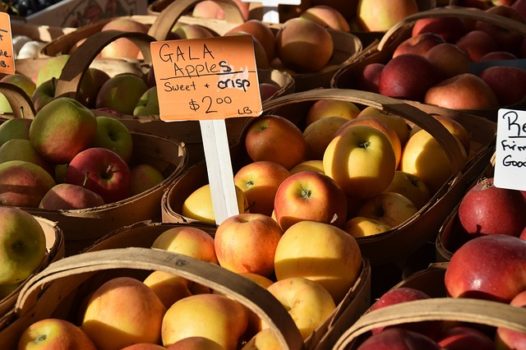
What farmers market do you want to be a part of?
There are more and more farmers markets popping up all over. With the increase of social media advertising sources, local markets are getting supported well. There has been a big movement to support and utilize locally produced food and products. Deciding on what farmers market you want to participate in is critically important.
Maybe you want to start with a smaller community market where you test the waters and see what you can come up with as far as produce and products. Many 4-H clubs will have a smaller local community or neighborhood farmers markets during the summer. Perhaps you can be a part of one of those smaller ones to begin with.
Maybe you are a larger grower or producer and need a better outlet. Look at some larger opportunities available. Many larger cities have more than one farmers market. With a little research you could be able to break into a great market.
Business plan
It is a great idea to have a business plan in place when you transition into a selling standpoint from your homestead. Once you decide to try making money from your produce, you will need to determine what you will grow and vend commercially. Things to consider are:
- What to grow or produce?
- When to plant?
- Dates and deadlines
- Costs
- Pricing
- Offer samples
- Packaging
- Branding
- Advertising
- Transportation
- Manning the booth
- Taxes
- Business license
- Insurance
What to grow or produce?
When planning to sell at a farmers market you need to plan ahead to produce something that is marketable. Perhaps planting 300 zucchini plants isn’t a great option unless you know that you can sell a boatload of zucchini squash when everyone else has a backyard zucchini plant producing a boatload of zucchini. Grow things or produce things that there is a good market for and something that you are able grow or produce well.
For instance, you may have a green thumb for growing peppers. Just take a look at Pinterest or Facebook or social media and see what peppers that people are liking and wanting. You can tailor your crop to the peppers that people want.
You may be a rutabaga man through and through and will only grow rutabagas. Well, then you better grow the best rutabagas and package them the best way possible for people to buy them.
I have found that I have a good results with chickens and egg production. I have focused on eggs to be a good cash product for our homestead. The market for free pasture range eggs is great where I live. This has made a great opportunity for our farm to sell every egg that we can produce.
When planning what you want to produce to sell at a farmers market, just plan ahead and do a little research. If you do your homework you will be able to plant the right tomatoes, or provide the right honey, or grow the best garlic that everyone wants and make money while doing it.
When to plant, or timing of your produce?
Timing is very important to consider in your business plan. You need to know when you can have your produce or products available and timed when the farmers market begins and ends. In the more competitive farmers markets they want you to be there from beginning to ending with good quality produce and products.
Be prepared to fill the agreement for the full season. Generally the farmers market seasons in my area begin at the end of May or mid-June, and end at the end of October or early November. Your area may differ, but it can be a challenge to provide good quality produce the entire season.
Perhaps planting different plantings throughout the season will give you fresh peak produce as the season goes on. Perhaps investing into a greenhouse to get crops growing earlier will pay off. Another idea would be to provide a good variety of crops that come into season as the year progresses. If you are a honey provider perhaps you can provide raw honey from last season, or provide bee products along with honey.
Again, just plan ahead to plant, or provide consistent produce and products throughout the season.
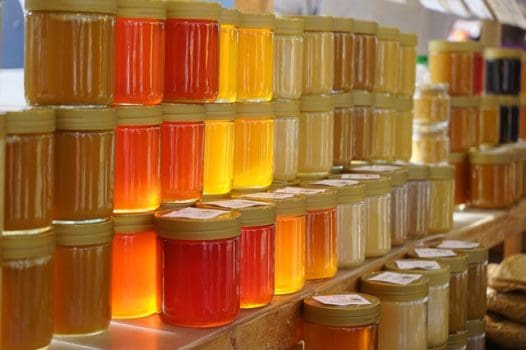
Dates and deadlines
When it comes to dates and deadlines on the homestead, the weather really determines a lot of what goes on and when. If it’s a cold spring your plants grow slower. If it’s a warm spring your lettuce will bolt sooner than you may have expected. You don’t have the luxury of letting the weather determine everything with the farmers market.
Some key deadlines will be the application to get into the market. Paying the booth rental fee will need to be done on time. You will need to have all your licenses, tax number, and payment options in order before you start.
Having produce or products available for the beginning of the farmers market may require you to have specific planting deadlines.
My irrigation system is on a drainage ditch system. We get a specific time to have the irrigation water and we need to plan accordingly for that. Often the irrigation will conflict with other obligations, so I need to plan for someone else to handle the water or to handle the market.
Costs
As part of your business plan you need to consider costs. Some basic costs to consider and keep in mind are:
- Seeds and plants
- Livestock- feed, equipment, housing, fencing
- Processing- washing, bottling, packaging, preserving, refrigeration
- Licensing
- Booth fees
- Booth equipment- tables, bins, coolers, table cloths, tarps, baskets, boxes
- Signage
- Transportation
- Manning the booth if you can’t be there
- Taxes
Pricing
This can be a tough one for a lot of people. You want to charge enough so you are actually making money. You also don’t want to charge too much to drive people away. It’s an interesting balance.
I have been to markets where a guy charged next to nothing and people wouldn’t buy from him because they thought something was wrong with his produce. He changed his process to be about the same as others were charging and he got sales.
Pricing is a finicky business. A rule of thumb if you are new to the business is to see what others are charging and charge similarly. You can adjust as you think you need to. If your asparagus is some super cool fancy best tasting stuff in the world, then charge for it, and let people know it’s the best ever and why. You will probably get people to pay what you think you need.
Be fare in your pricing and you will get a good response. As you grow a customer base and get a good reputation you will be able to charge what you feel is right. Keep in mind that supply and demand is important to keep in mind. You might need to adjust your prices on the fly and needed.
Offer Samples
One good thing to remember is to offer samples of you can. People love to get free stuff. They also will love being able to try the produce before they buy. Plan in your inventory some samples that you can make available. Be careful not to sample out your whole supply, but if you can give some samples you will get more folks to stop by and try. When they find out how great your produce is they may purchase.
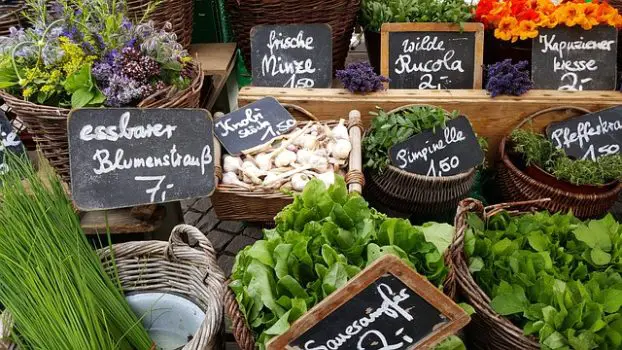
Branding
Branding is becoming more and more important. You need to be attractive to customers and memorable. This doesn’t mean you need to look like a super slick fancy pants, unless that’s your style.
The branding I am talking about is the overall look and feel of your booth. If you show up with everything jumbled together in dirty shopping bags sitting on the ground and hoping that people will spend top dollar for your hard-earned produce, you may want to rethink. If you show up with neatly presented produce or products on a table with clear signs showing the varieties and costs you will have upped your chances of sales.
Showing up clean and orderly with great produce is a must. Fun signage with descriptions of the produce and prices will help. Have some things that will engage the customer such as good photos of the homestead, descriptions of the benefits and nutrition of your produce, fun facts about your homestead or farm. Have your own containers or sacks for people to use or purchase with your logo or unique look.
Good branding can often sway people to like you, trust you, and become good customers of yours for years.
If you do a good job on your branding you can expand your sales to other items besides produce. You could have your own branded line of products that would fit into a farmers market. Some of these products to consider are:
- Reusable grocery bags
- Stickers
- Mugs
- Coolers
- Shirts
- Hats
- Aprons
- Calendars
- Hoodies
- Jackets
- Yoga mats
- Water bottles
- Draw string backpacks
- Etc.
Depending on the room you have available you could bring in items of interest to attract people to your booth. I have seen some bring old farm trucks or tractors that make a big draw. Some people will bring animals like chickens, donkeys, mules, or cows with them to draw attention. A goat dairy brought a female goat and let people milk her if they wanted to. One guy even charged $.50 to milk his cow and have your picture taken.
With good branding you can create quite an experience for people and they will want to support you and your homestead, farm, and garden efforts.
Advertising
Cost of advertising is up to you and what you are willing to pay. Many local options are available from local newspapers, banners at high school football and baseball games, or sponsor local events such as city parades and celebrations. This will show that you are a community supporter and can get people to support you back.
There are many ways that are free for advertising your efforts in a farmers market. Many of the larger farmers markets will advertise the entire market and you can trust in their efforts. The larger farmers markets use part of your booth rental fee for advertising.
You can also use social media very effectively. Facebook has many options of groups to join the locally grown farmers market focus. As you interact in the groups you will gain supporters and possible customers. Built in audiences are in Facebook groups and online community forums. Pinterest groups are very effective. Instagram is also an effective tool for advertising, but perhaps not as locally targeted.
Make sure you have your information correct online if you have a website. You need to have everything in order and have your local information optimized, meaning correct on all accounts like google and yelp etc. You can get a lot of people searching online for local options. Try to get folks to follow you on Facebook and leave reviews on yelp. These reviews really matter and help out.
Transportation
Another thing to incorporate into your business plan is transportation of you and your goods to the farmers market. A small neighborhood farmers market could be handled with a wagon or wheel barrel. You could use the trunk of a car or a pick-up truck. If you need to transport your produce or products for a longer distance transportation is something to really think about.
Some people will go in together on renting a van or U-Haul type trailer. If you pool your resources with some other participants in the farmers market you can spread out the cost of transportation a bit. If you have a van or truck that can haul stuff for other participants in the farmers market you could help haul their stuff for a fee or do it for free to get some good will going with your fellow sellers.
Employees
You may need to have someone cover your booth if you are not able to be there. With the smaller community farmers market, you can probably skip out when you need to without much consequence. You may even be able to work out a system with some fellow participants to cover for each other when needed.
If you ditch out on the larger farmers markets you may have some repercussions, perhaps even being kicked out. It would be a good idea to have someone cover your booth for you if you need to be absent. This is where a good employee could help out, but that will add to cost and you need to consider this in your business plan.
Taxes
Taxes are a part of all monetary transactions in the United States. Perhaps on other countries this doesn’t factor in, but in the U.S., you need to keep good records and be ready to pay taxes. Some people choose to add tax to the sales at the time of purchase, others will just put the sales tax into the amount they initially charge. This makes it a lot easier when making cash transactions on the spot.
If you can keep your prices at a simple round number, then it is a simple transaction for the customer. Keeping the customer happy is a good idea. You can figure out how much the taxes will cost after the day is done. I recommend keeping it easier for the customer and doing your accounting later. Be sure to actually do your accounting and pay your taxes. The repercussions of not paying taxes may haunt you for years
Getting a license
Some towns and farmers markets don’t need you to have a license to sell. Some farmers markets will require a business license or permit to sell produce and products at a farmers market.
Getting a license isn’t difficult. It will take a little time to research what your county or municipality requires. Most of the time it will require filling out a form, paying a fee and waiting for your paperwork to get processed. Not a big deal, but something that should be done in advance of opening day at the market.
Some of the larger markets will issue a temporary license or permit as part of your admission to their market. As with getting your own license you will probably just need to fill out the proper form and pay a fee.
Insurance
Insurance is something to consider. Chances are you won’t need any insurance to sell produce and products at a farmers market. You will need to consider having insurance, but most larger farmers markets will have insurance as part of your booth rental or admission fee. However, some may not, so look into the contract.
By and large most people shopping at a farmers market know that they take some risk of locally grown produce. Most have had experience with farmers markets and will take the precautions of properly cleaning and if needs be cooking the produce.
You will need to have proper insurance on any vehicles that you will be using to transport your produce and products to the farmers market. So if you have a farm truck that you haven’t kept up with insurance on because you just use it on the farm, you will need to get insurance on the truck if you are going to drive it on pubic highways and roads. Not that complex of an idea, but some of us forget to do stuff like that when we are in a rush.
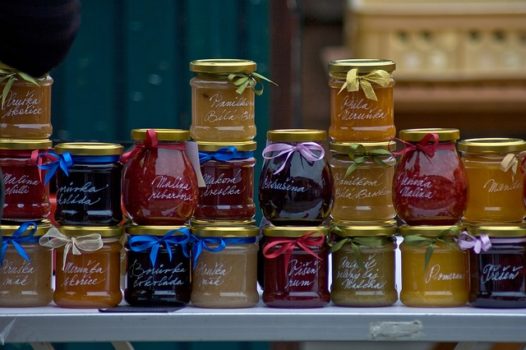
Starting your own farmers market
Another option is to begin your own farmers market. This could be a fun challenging thing to try. I will follow up this post with one about starting your own farmers market, but it could be a great opportunity. With a little research you could get one going easily and create a good avenue for you and your friends to market your produce and products.
Make it simple, easy, enjoyable, and sustainable to do
If you can make the process of selling at a farmers market simple, easy, and enjoyable. You will probably make it sustainable as a byproduct. Especially at first keep it simple and add more as you gain experience and knowledge. The learning curve will be different for everyone, just do what feels right and grow or stop as you feel you need to.
One major key that help is to plan ahead. Plan ahead and keep it realistic. Don’t over or under estimate what needs to be done and when it needs to be done by.
Have a plan B or contingency plan if problems arise. Problems always arise on a homestead and farm. If you have a bumper crop of radishes and lettuce and the weather gets hot where you could lose the quality of your radishes and lettuce, then a plan B would be to lower your prices, or perhaps contact local restaurants to purchase what you don’t sell at the market.
Involve family, friends, and partners in the process. You can have some great time together getting the produce and products ready for the market. You can teach valuable lessons to your family sorting vegetables or marketing to friendly folks. If you know you are not alone in this endeavor, you can relax a little more and have fun which will make people want to purchase form you because you are enjoyable to be around.
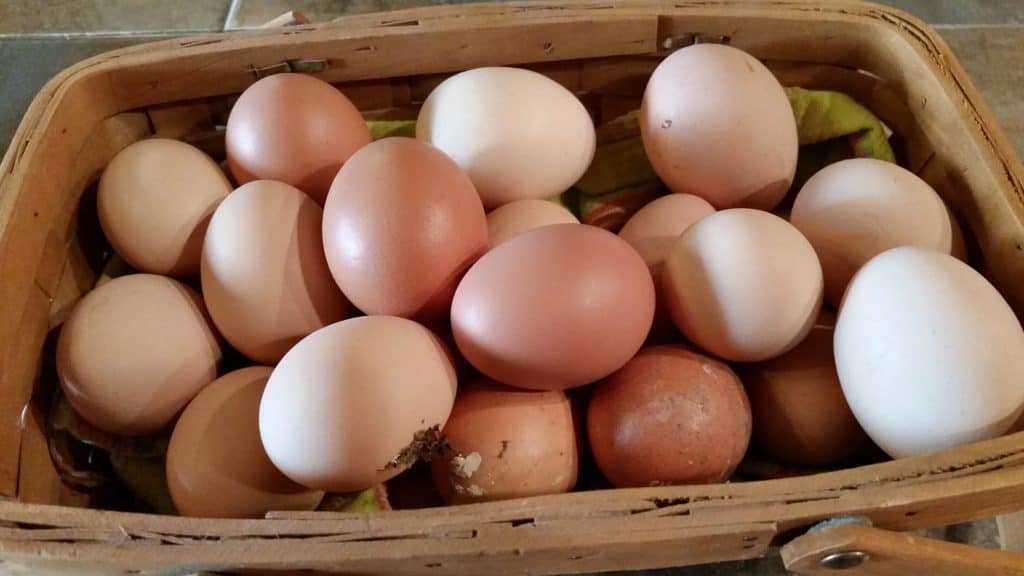
Summary
To make money at a farmers market is very doable. You need to plan ahead on what you are going to produce. You will need to research what options of farmers markets are available for you to be a part of, and choose which one or ones you want to participate in. Be organized and have a business plan. When working the farmers market have high quality produce and products. Be organized, clean, and friendly. With the popularity of locally grown produce and product from farms and homesteads the farmers markets are doing well and are a great option to make money from your labor.

